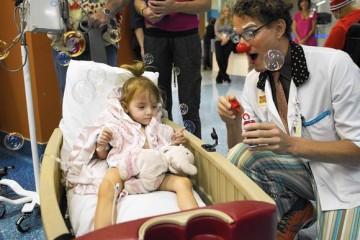From the Daily Pilot
By Hannah Fry
 When Newport Beach philanthropists Ralph and Sue Stern were first introduced to medical clowning through a video clip of a project that originated in 2002 in Israel, two people immediately came to mind: entertainer Frank Sinatra and author Norman Cousins.
When Newport Beach philanthropists Ralph and Sue Stern were first introduced to medical clowning through a video clip of a project that originated in 2002 in Israel, two people immediately came to mind: entertainer Frank Sinatra and author Norman Cousins.
They recalled the lyrics of Sinatra’s “When You’re Smiling,” in which he croons “when you’re laughing the sun comes shining through,” and Cousins’ much repeated phrase that “laughter is the best medicine.”
Clown care, known as medical clowning, has become a popular program in hospitals on the East Coast through the Big Apple Circus’ Clown Care program, in which specially trained clowns visit patients in an effort to lift their moods with humor and laughter as they undergo sometimes painful or uncomfortable procedures.
But as the Sterns did some research, they realized that no hospitals on the West Coast employed the program.
“After we saw the impact the program had in Israel and how much everyone at other hospitals raved about it, we knew we wanted to help bring it here,” Ralph Stern said
Two months ago the Children’s Hospital of Orange County became the first medical center on the West Coast to have “clown doctors” after the couple donated $500,000 to bring the method of treatment to the Orange facility. The donation from the Sterns, who are well-known for their contributions to organizations like UCI Medical Center and Girls, Inc., will sustain the program for three years.
“Laughter is a natural medicine. It lifts our spirits and makes us happy,” Ralph Stern said. “These children see doctors and nurses all day long, but when a clown walks into the room, it’s fun.”
On Thursday afternoon, CHOC staff and patients officially welcomed the program to the hospital with a carnival featuring the “clown doctors” wearing white lab coats over their traditional striped and polka dot outfits, curly wigs and candy apple red noses.
Patients and their families snapped pictures in the photo booth, played carnival games and snacked on traditional circus treats not found on most hospital menus, like popcorn and cotton candy. The smell of sugar and butter permeated the outdoor area of the carnival, beckoning the patients and their parents to get indulge in a treat.
For some of the child patients, the carnival was more than just an afternoon of fun, it was an opportunity to leave their hospital rooms, interact with the outside world and perhaps for a moment forget about their illness.
Stephanie DeMello, the manager of the child life department at CHOC, works each day to focus on the emotional needs of kids that are coming in for a quick procedure as well as those who must remain in the hospital for long periods of time.
“A lot of times these kids feel like they’re identified by their illness,” she said. “If they can have a moment of laughter or joy they don’t have to think about being the kid with diabetes. They can just be a regular 5-year-old kid.”
The clowns, who visit the hospital two days each week since the program began two months ago, see children in the oncology, neurology, as well as the emergency department. Having a clown blowing bubbles down the hall or cracking a joke lightens the whole mood of the unit they visit, DeMello said.
“Suddenly, you feel like the whole place has transformed,” she said. “It’s so much more successful than I ever could have imagined.
Patient Brandon Gonzales had another reason to celebrate during the carnival Thursday. It was his 12th birthday and, unfortunately, he said, the day that marked his third week in the hospital fighting an infection.
Gonzales, who has been in and out of CHOC since he was diagnosed with leukemia two years ago, said the clowns’ improv comedy is a fun change of pace compared to the often serious mood of the hospital.
“It’s nice to be able to have fun and be distracted for a little while,” he said.
But, of course, his favorite part of the carnival was the brightly colored display of cake and cupcakes.
“It’s like a bunch of birthday cakes,” he said.












